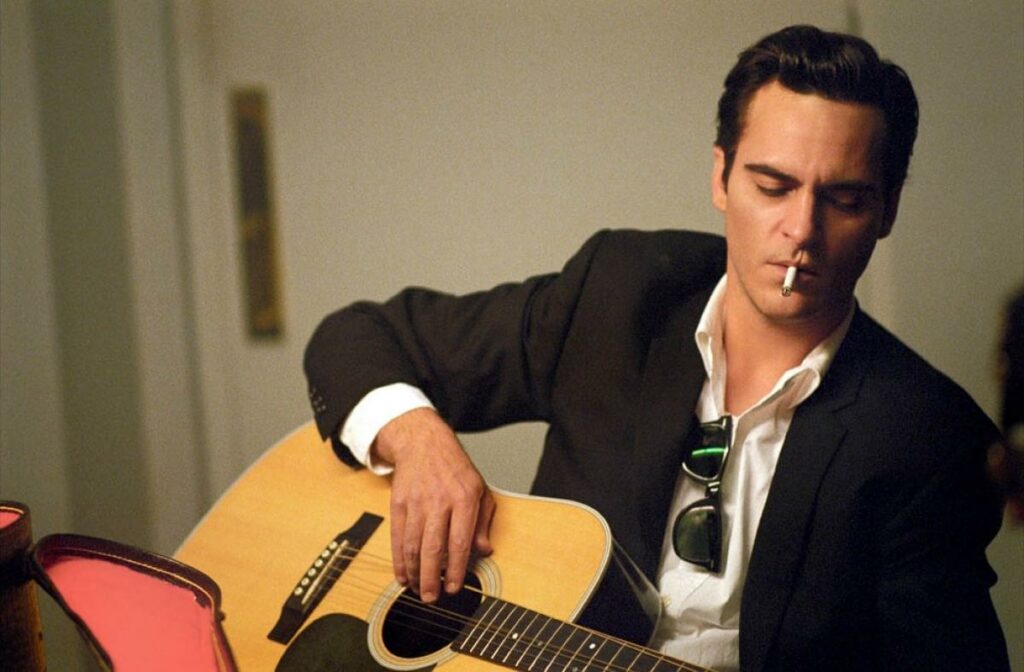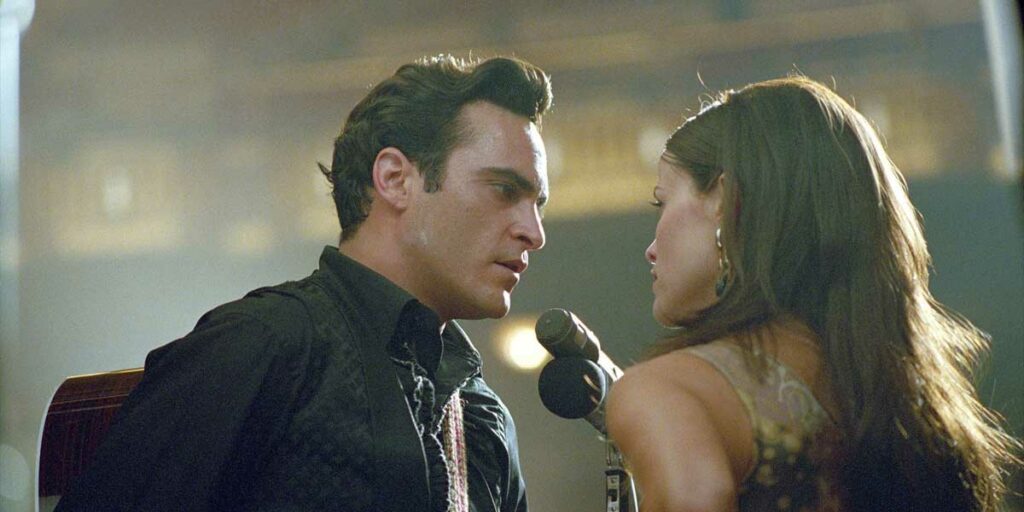Walk the Line exemplifies the biopic formula working effectively, even if it tells only part of the legendary Johnny Cash story.
Biopics get a bad rap these days. However, this was not always the case. When Walk the Line hit theaters in 2005, audiences raved over Joaquin Phoenix’s portrayal of music legend Johnny Cash. The film was critically successful as well, scoring several Academy Award nominations. What sets Walk the Line apart from more recent biopics is its creative focus (thanks to director James Mangold), and its powerhouse performances (thanks to Phoenix and Reese Witherspoon). Though it may not completely summarize Cash’s importance, the film does stand apart as a true work of art, rather than a corporate, by-committee caricature of a famous musician.
James Mangold has developed a clear style throughout his films, and that style is certainly present in Walk the Line. His use of establishing shots (particularly the opening shot of Folsom Prison, where Cash performed his famous live album), the up-close and often uncomfortable nature of the concert scenes, and his focus on characters’ faces provide an invading atmosphere. Oftentimes, recent biopics opt for a 30,000-foot view of an artist’s life, leaving their films emotionless. Here, Mangold gets up close and personal, adding depth to those whom we often see as simply performers rather than complex people.
For Mangold to add complexity to the characters, the performances also need to show a degree of complexity. Biopics need, more than anything, to show the humanity of their subjects. Thankfully, both performers at the heart of Walk the Line work incredibly well, especially together. Phoenix channels the Man in Black’s characteristics, both external and internal, especially shining when allowed to go berserk, which he does on more than one occasion. The reenacting of the infamous Grand Ole Opry show when Cash drunkenly kicks out the stage’s footlights showcases Phoenix’s ability while also channeling the singer’s darker side.
Witherspoon, however, is the real scene stealer here. Her June Carter is an absolute ball of energy from beginning to end. She shifts between on-stage funny gal to off-stage independent woman flawlessly, serving as a simultaneous foil and compliment to Phoenix. The two also performed the famous songs themselves, adding another layer of realness in a genre that, despite its focus on real personalities, too often feels stale and artificial.

Despite the great chemistry on display, it is hard not to feel like the Johnny Cash legend as a whole was done a disservice by the film simply focusing on the love story. Because of the devotion to Cash and Carter’s relationship, several interesting ideas are toyed with but never fully explored. At the beginning of Walk the Line, it seems as though Mangold wanted to explore the spiritual dichotomy at play in Cash’s soul. An early scene where Cash and his band audition for a record deal reveals this idea of the singer as a conflicted spirit when the band plays an old, slow gospel song, only for Cash to explode into a performance of “Folsom Prison Blues,” which features lines like “I shot a man in Reno, just to watch him die.” This seemingly impossible union of good Christian boy and devilish outlaw is a true piece of what made Cash so fascinating. Yet, here, this piece of the puzzle is reduced to a subplot, and a little-developed one, at that.
Another underdeveloped aspect of Cash’s life is his relationship with his father, Ray (Tim Patrick). The film’s emotional beginning sees the death of Johnny’s older brother, Jack, in a sawmill accident while Johnny fishes. Ray blames Johnny for Jack’s death, even saying “The devil did this. He took the wrong son.” Ray’s rejection of Johnny is a key driving force behind his music career, yet in the film it plays out in only a couple of tense scenes, including a Thanksgiving dinner scene where a drunk Cash and Ray engage in a heated argument. While these scenes work individually, it does not feel like they do enough to deepen the lore of Cash’s hidden insecurities.
While it is good that the film chooses to really focus on only one aspect of Cash’s life – it would feel cluttered and overstuffed otherwise – it may feel as though the audience is being slightly cheated out of the full Man in Black mythology. The whole story is squished into an easy romance template and leaves little room for any nuances or complexities outside of the central love story. Those looking for an all-encompassing look at Cash’s life will have to readjust expectations. This may be a good or bad thing depending on who you ask, but it is important to note that Mangold is telling simply one part of a larger story, while simply alluding to other aspects of the legend of Johnny Cash.
Part of the reason biopics get a bad rap, as mentioned before, is because they often try to throw everything they can about the famous subject up there onto the screen. This leaves little room for an actual story and for an actual character to emerge. Often, what’s left is a cheap imitation and a rehash of the same story tropes. Walk the Line gets credit for truly trying to take the audience into the mind of a tortured soul. Cash was a complicated figure, and this film captures a glimpse of that complication, even if it fails to capture all of it. The case can be made, though, that capturing a myth was never Mangold’s intention. If his intention, rather, was to tell a real love story with real characters, consider Walk the Line an abundant success.
Walk the Line is now available to watch on digital and on demand. Watch Walk the Line!

